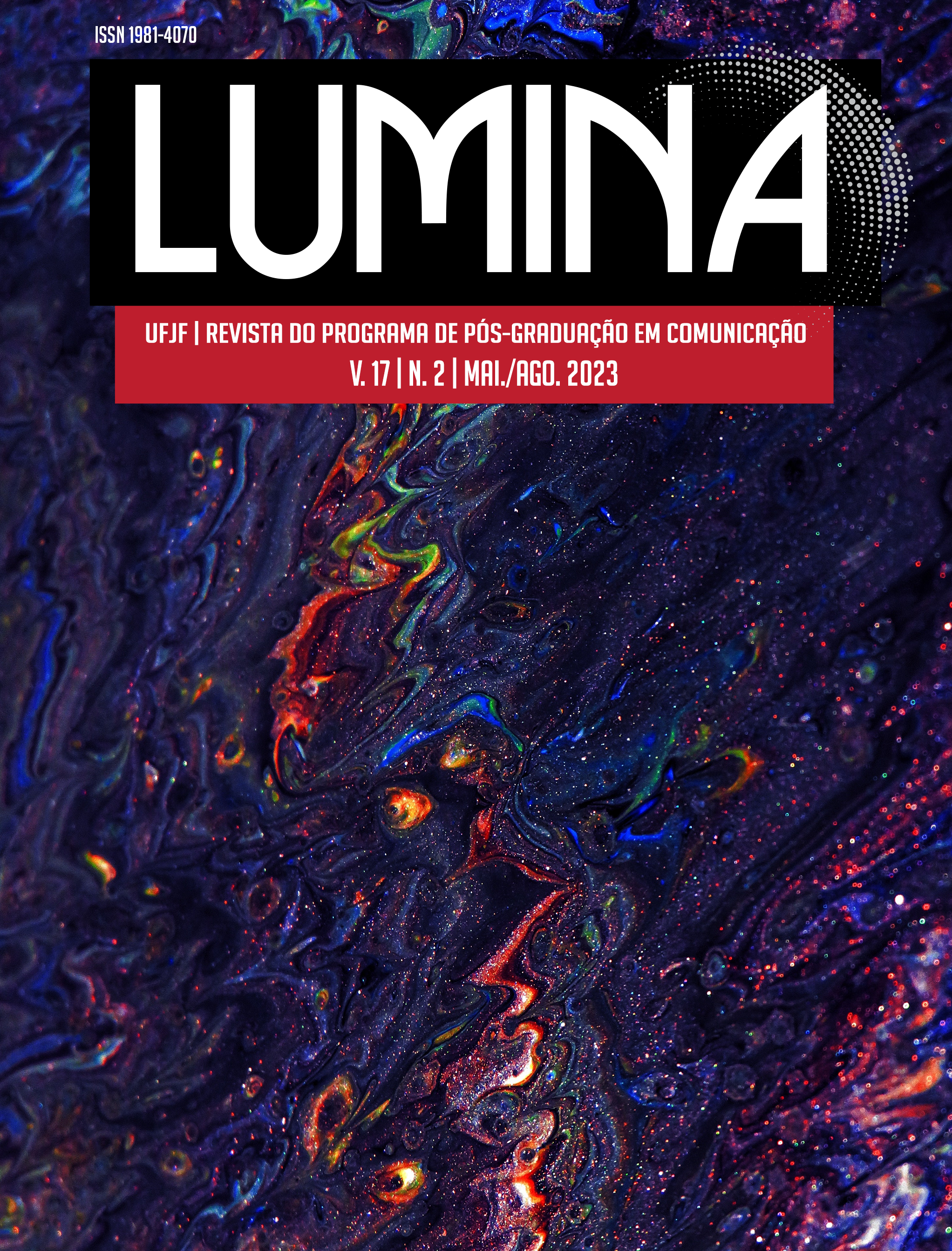Estratégias possíveis para o jornalismo digital a partir do The Trust Project
DOI:
https://doi.org/10.34019/1981-4070.2023.v17.39504Keywords:
Transparência, Processos editoriais, Audiência, 8 Indicadores de Confiança, Inteligência ArtificialAbstract
This article analyzes how the eight indicators of The Trust Project contemplate the descriptions of journalistic work so that the reader can follow them as a guide to certify to the veracity of the news. The focus of analysis is the document “8 Trust Indicators”, created from surveys with the public to define/suggest practices in the journalistic process that should be incorporated into news sites. The methodological procedures of a qualitative approach consist of literature review, document analysis and content analysis technique. The theory intends to expand the debate on how much initiatives such as The Trust Project could represent a first step in the recovery of trust in journalistic institutions, identify gaps and even suggest possible complementary actions. As the project's strategies focus on the transparency of journalistic processes, we notice the possibility of adopting emerging technologies and interactivity with the audience. We suggest to The Trust Project a new indicator - Indicator 9 - Tools in order to clarify the use of technique, software or AI in the construction of the news - and the expansion of the circulation of the information from indicators 2, 4 and 5.
Downloads
References
BARDIN, L. Análise de Conteúdo. São Paulo: Edições 70, 2016.
CORPORACIÓN LATINOBARÓMETRO. Latinobarómetro 2020. Santiago, 2020. Disponível em: <https://bit.ly/46LsBjd>. Acesso em: 20 out. 2021.
CORPORACIÓN LATINOBARÓMETRO. Latinobarómetro 2018. Santiago, 2018. Disponível em: <https://bit.ly/46LsBjd>. Acesso em: 20 out. 2021.
DOMINGO, D. Fostering and moderating citizen conversations. In: ZION, L.; CRAIG, D. (Eds). Ethics for digital journalists – emerging best practices. Nova York: Routledge, 2015, p. 159-173.
FONSECA, V; SEIBT, T. A contribuição de Max Weber para os Estudos do Jornalismo: um ensaio teórico-metodológico. Intexto, n. 34, p. 640-657, 2015. Disponível em: <https://bit.ly/3QeqGOv>. Acesso em: 20 out. 2021.
GUERRA, J. L. O percurso interpretativo na produção da notícia. São Cristóvão: Editora UFS, Fundação Oviêdo Teixeira, 2008.
KALOGEROPOULOS, A; SUITER, J; EISENEGGER, M. News Media Trust and News Consumption: Factors Related to Trust in News in 35 Countries. International Journal of Communication, v. 13, p. 3672–3693, 2019. Disponível em: <https://bit.ly/3QCeo2m>. Acesso em: 10 ago. 2023.
LEMOS, A. Cibercultura como território recombinante. In: TRIVINHO, E.; CAZELOTO, E. (Orgs.). A cibercultura e seu espelho [recurso eletrônico]: campo de conhecimento emergente e nova vivência humana na era da imersão interativa. São Paulo: ABCiber; Instituto Itaú Cultural, 2009, p. 38-46.
MACEDO, K. C. A. As interações entre leitores na seção The long read do The Guardian: entre a política editorial de moderação e a participação das audiências ativas. 146 f. Dissertação (Mestrado em Comunicação) – Programa de Pós-Graduação em Comunicação, Universidade Federal do Paraná, Curitiba, 2020. Disponível em: <https://bit.ly/3hBJVSM>. Acesso em: 29 set. 2021.
MARCONI, F. Newsmakers: artificial intelligence and the future of journalism. Nova York: Columbia University Press, 2020.
MASIP, P. et al. Active audiences and journalism: involved citizens or motivated consumers?. Brazilian Journalism Research, n. 1, v. 1, p. 234-255, 2015. Disponível em: <https://bit.ly/43pzQdB>. Acesso em: 29 set. 2021.
MASIP, P. Investigar el periodismo desde la perspectiva de las audiencias. El profesional de la información, n. 25, v. 3, p. 323-330, 2016. DOI: <https://doi.org/10.3145/epi.2016.may.01>.
MOREIRA, S. V. Análise documental como método e técnica. In: DUARTE, J.; BARROS, A. (Orgs.). Métodos e técnicas de pesquisa em comunicação, v. 2, São Paulo: Atlas, 2005, p. 271-279.
NEWMAN, N. et al. Reuters institute digital news report 2021. Reuters Institute for the Study of Journalism, 10 ed., 2021. Disponível em: <https://bit.ly/3pMlKFw>. Acesso em: 14 out. 2021.
NILES, R. The programmer as journalist: a Q&A with Adrian Holovaty. Online Journalism Review, 2006. Disponível em: <https://bit.ly/43qXOW5>. Acesso em: 8 nov. 2022.
SAAD, E. Reflexões sobre ontologias jornalísticas no contexto de desinformação e crises sistêmicas. Fronteiras, n. 23, v. 2, p. 58-72, 2021. DOI: <https://doi.org/10.4013/fem.2021.232.05>.
STRÖMBÄCK, J. et al. News media trust and its impact on media use: toward a framework for future research. Annals of the International Communication Association, v. 44, n. 2, p. 139-156, 2020. Disponível em: <https://bit.ly/3DbI52z>. Acesso em: 20 ago. 2021.
TRIELLI, D.; DIAKOPOULOS, N. How Journalists Can Systematically Critique Algorithms. COMPUTATION + JOURNALISM SYMPOSIUM, v. 8, Nova York: ACM, 2020. Disponível em: <https://bit.ly/3PJ1dt8>. Acesso em: 28 set. 2021.
THE TRUST PROJECT. About us. Disponível em: <https://thetrustproject.org/about/>. Acesso em: 20 ago. 2021.
TOFF, B. et al. What We Think We Know and What We Want to Know: Perspectives on Trust in News in a Changing World. The Reuters Institute for the study of Journalism: Oxford University Press, 2020.
TRYGG, S. Is Comment Free? Ethical, editorial and political problems of moderating online news. Blog Polis of London School of Economics and Political Science, 2012.
Published
How to Cite
Issue
Section
License
Autores que publicam nesta revista concordam com os seguintes termos:
- Autores mantém os direitos autorais e concedem à revista o direito de primeira publicação, com o trabalho simultaneamente licenciado sob a Licença Creative Commons Attribution que permite o compartilhamento do trabalho com reconhecimento da autoria e publicação inicial nesta revista.
- Autores têm autorização para assumir contratos adicionais separadamente, para distribuição não-exclusiva da versão do trabalho publicada nesta revista (ex.: publicar em repositório institucional ou como capítulo de livro), com reconhecimento de autoria e publicação inicial nesta revista.
- Autores têm permissão e são estimulados a publicar e distribuir seu trabalho online (ex.: em repositórios institucionais ou na sua página pessoal) a qualquer ponto antes ou durante o processo editorial, já que isso pode gerar alterações produtivas, bem como aumentar o impacto e a citação do trabalho publicado (Veja O Efeito do Acesso Livre).








